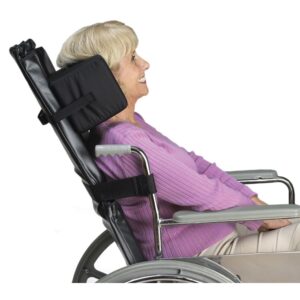For individuals reliant on wheelchairs for mobility, ensuring optimal comfort and support is paramount. While much attention is often given to factors such as seat cushioning and posture alignment, one crucial yet frequently overlooked aspect is neck support. Proper neck support not only enhances comfort but also plays a significant role in preventing discomfort, pain, and even serious health complications. In this comprehensive guide, we delve into the importance of wheelchair neck support, its benefits, and essential considerations for selecting the right support system.
Understanding the Importance of Neck Support
Neck support is vital for maintaining proper alignment of the cervical spine. Prolonged periods of unsupported neck posture can lead to strain, muscle tension, and even spinal misalignment.
Individuals with limited mobility may have difficulty adjusting their neck position independently, making them more vulnerable to discomfort and injury without adequate support.
cProper neck support promotes relaxation and reduces fatigue, contributing to overall well-being and quality of life.
Benefits of Wheelchair Neck Support
Pain Prevention: Adequate neck support helps distribute pressure evenly, reducing the risk of pressure sores and ulcers, which are common concerns for wheelchair users.
Posture Support: Maintaining proper posture is essential for preventing musculoskeletal issues. Neck support aids in aligning the head and neck with the spine, reducing strain on the neck muscles.
Enhanced Comfort: Well-designed neck support enhances overall comfort during prolonged periods of sitting, allowing individuals to engage in daily activities with greater ease and enjoyment.
Respiratory Function: Proper neck support can also impact respiratory function, as it helps keep the airways open and unobstructed, facilitating easier breathing.
Types of Wheelchair Neck Support
Headrests: Headrests provide support for the back of the head and neck, offering stability and comfort. They come in various shapes and sizes to accommodate different needs and preferences.
Neck Pillows: Neck pillows are designed to support the natural curvature of the cervical spine, promoting proper alignment and reducing strain. They are often adjustable to suit individual preferences.
Lateral Supports: Lateral supports help prevent lateral head movement, providing stability and support for individuals with limited neck control.
Considerations for Selecting Wheelchair Neck Support
Individual Needs: Consider the user’s specific requirements, including any existing medical conditions, range of motion, and level of neck control.
Adjustability: Opt for neck support systems that offer adjustability to accommodate different positions and preferences.
Material and Comfort: Choose materials that are soft, breathable, and durable for optimal comfort and longevity.
Compatibility: Ensure compatibility with the wheelchair model and seating system to ensure proper installation and functionality.
Consultation: Seek guidance from healthcare professionals, therapists, or assistive technology specialists to determine the most suitable neck support solution.
Conclusion
Wheelchair neck support is not merely an accessory but a vital component of ensuring comfort, stability, and overall well-being for individuals with mobility impairments. By providing adequate support for the cervical spine, neck support systems help prevent pain, promote proper posture, and enhance respiratory function, ultimately improving quality of life. When selecting a neck support system, it’s essential to consider individual needs, adjustability, comfort, and compatibility to ensure optimal effectiveness. By prioritizing neck support, we can empower wheelchair users to lead more comfortable, fulfilling lives with greater independence and confidence.
